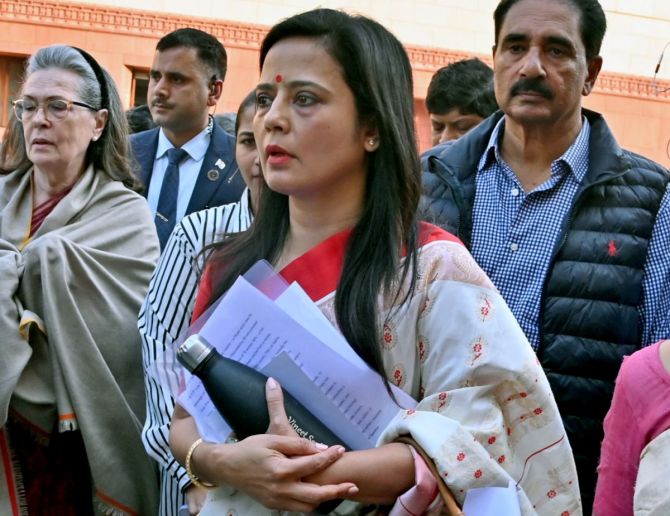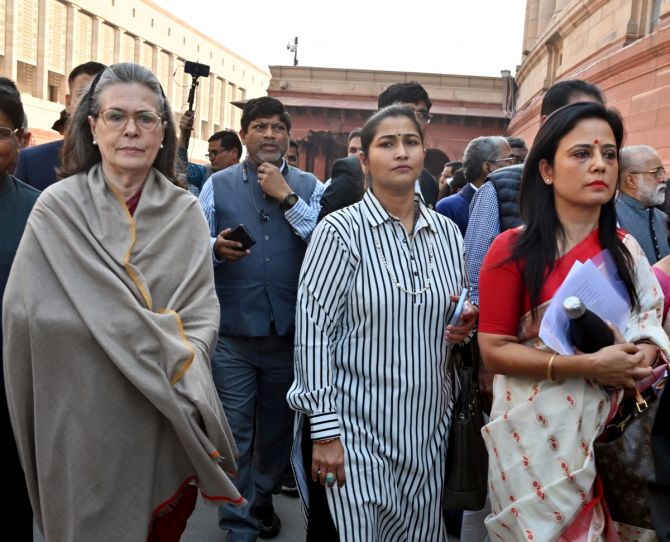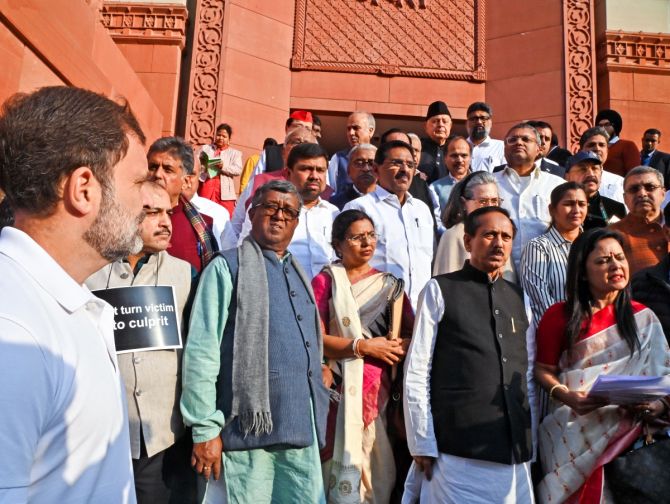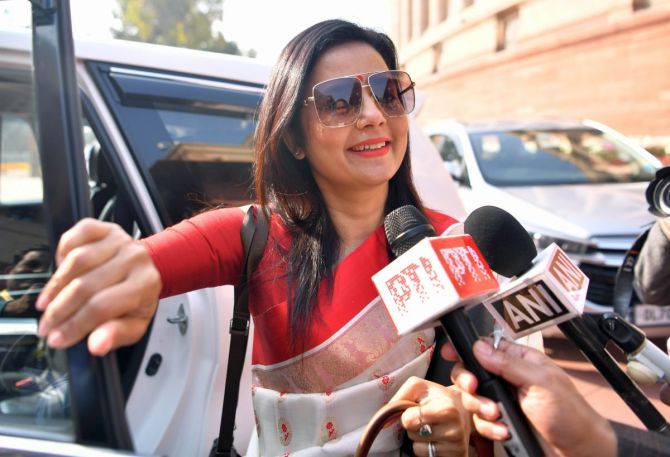For that to happen, Moitra's much followed speeches should be heard outside Parliament so that the PR spins of the ruling dispensation are countered with informed debate, argues Shyam G Menon.

Going by news reports published so far, the recent expulsion of Mahua Moitra from Parliament was based on one established fact -- that she shared her log-in details (for the Lok Sabha portal) with another person.
It is a point to be viewed in conjunction with the fact that the reports also mentioned that no guidelines over access have been laid down yet and several parliamentarians share such details with their staff including due to some of the elected members not being digital-savvy.
Aside from this conduct on Moitra's behalf, which has been construed as a potential threat to national security, the other charges were in the realm of allegations pending proof.
To the extent, the Ethics Committee recommended expulsion on a debatable point it had proof for (while leaving the rest to competent agencies to investigate) and failed to cross examine everyone crucial to the issue, the committee's decision will remain as suspect as the parliamentarian's alleged intentions behind posing questions in parliament.
That Moitra was formally expelled after the committee's report was distributed to members of Parliament with inadequate time for study, very limited time offered for discussion and she denied an opportunity to speak, will go down as an unconvincing exercise.
Remember -- behind every member of Parliament, from the one recommended for expulsion to those approving it, is an electorate, which must be convinced.
No wonder, on the day of her expulsion certainly (and likely for the short term) Moitra's angry outburst of having been tried by a 'kangaroo court' rang true.
The Opposition closed ranks and stood behind her. She spoke of fighting the Bharatiya Janata Party for the next thirty years.
On December 11, 2023, news reports said Moitra had moved the Supreme Court against her expulsion.

Viewed purely as the media image and personality she has been, Moitra doesn't appear the regular sort of politician.
Some of our women parliamentarians have enjoyed the benefit of being born into families that spawned political parties or came from influential circles.
Once into politics, there is the ritual of keeping a patriarchal system happy.
Although things are changing, tolerance (leave alone appreciation) for an independent woman in India is as tough to come by as appreciation for the individual despite our Constitution speaking up for the individual.
Moitra's rise in politics, as we know from profiles in the media, had little of the political privilege some of our women parliamentarians enjoyed.
Educated here and abroad, she traded a career overseas in banking, for politics in India.
In her first tenure in Parliament itself, she was widely noticed for her public speaking and questions posed with homework done.
Moitra's fiery speeches were keenly followed by the public, especially the urban public.
For the depleted and hunted Opposition, she was an asset. For the very same reason, she also became a thorn in the side of the ruling party.
Following her expulsion, she said -- and rightly so -- that parliamentarians are conveyor belts for questions.
A question may be posed in Parliament but its genesis and research lay outside.
As long as favors as inducements haven't been traded, the facts are correct and there is relevance to Parliament in what is being said; it is hard to fault the question because the groundwork was outsourced.
What matters is that the member concerned know the subject thoroughly and be capable of explaining/defending it alone in Parliament, for outsourced debaters have no place there.
However, it must be equally admitted that to the extent outsourcing is the case, the image of independence gracing a member would diminish, which is a diminution s/he shares with most parliamentarians for it is unlikely that anyone is doing their work without some help from outside.
In Moitra's case, the diminution will be acutely felt because she appears to have got caught between two businessmen, instead of shall we say -- the people and big business.
The mistake put a question mark on the intent of her questions even if the questions per se were valid.

Still, the real quagmire in which her political foes would try to trap Moitra may not be with regard to her professional conduct, but her choice of personality that is so different from what the ruling party and its cohorts, going by their preferred social messaging, approve.
A lot of her private life has already been bandied about. Media reports quoting from submissions to the Ethics Committee by some of the parties involved, have cited descriptions of Moitra as ambitious, which in the Indian social and political milieu valuing humility -- even fake humility -- would be a red flag, particularly when ascribed to a woman.
Reports have spoken of uncomfortable personal questions asked by the panel examining the issue.
To think that at least some sections of the electorate won't factor in these angles when evaluating the Mahua Moitra episode, would be a fallacy.
Not everyone will buy the BJP line. Unfortunately, some don't make all and majoritarianism is what Indian politics has come to be fueled by. And it is a patriarchal majoritarianism; one that prevents us from putting personal rights above the social patterns and behavior one got habituated to.
The BJP represents the deep end of such habituation and in that conservative iconography, it is unlikely that Moitra merits empathy. There will be those drawing satisfaction from her exit.

Moitra served as a member of the West Bengal assembly, representing Karimpur, from 2016 to 2019 and later as a member of Parliament representing Krishnanagar from 2019 to 2023.
She has been general secretary and national spokesperson of the All India Trinamool Congress.
On November 13, 2023, in the wake of the controversy in Parliament, she was made the Trinamool Congress district president of Krishnanagar (Nadia North).
As mentioned, the gravity of the alleged national security threat in Moitra's conduct and concrete evidence to prove that she asked questions for favours await investigation.
Keeping that aside and assuming that she meant the 30 year battle with the BJP in all seriousness, her future depends on how well her story resonates with the public.
Uniquely, popular support is also what makes the reported target of her questions in Parliament, formidable.
Influential businessmen and their giant companies have selfish interests and questionable styles of operation, including lobbying the government. But they employ thousands of people and in the avatar of publicly listed companies, acquire a shareholder strength that is even bigger.
It is through their capacity to provide jobs and their shareholder base (along with the wealth they generate and distribute) that billionaires launder the inequality in their existence into a benevolent normalcy.
Today, business tycoons and the corporate workforce wield significant influence in Indian politics, particularly as sculptors of aspiration.
The general erosion in respect for freedom and democracy -- they being looked upon as avoidable irritants on a path to regimented higher goals -- is partly due to the rise of this mentality focused primarily on wealth creation with modernity only a distant second or third as priority.
More than any other party, the BJP has successfully tapped this constituency.
Against this how effective can Moitra's claim of a 30 year-long battle with the BJP, be? For that to happen, Moitra's much followed speeches should be heard outside Parliament so that the PR spins of the ruling dispensation and their actions in service of the off-stage patrons they bow to, are countered with informed debate.
In other words, the foreign returned banker-turned-politician must be heard in geographies beyond Parliament and Bengal and in a manner that is not limited to urban liberals.
In a democracy, the right place for a politician and the safest place is with the people. Can she do that? Or will the quagmire she got into -- especially that dissonance with the generally accepted iconography of an ideal Indian existence -- suck her in?
Shyam G Menon, is a freelance journalist based in Mumbai.
Feature Presentation: Rajesh Alva/Rediff.com











 © 2025
© 2025